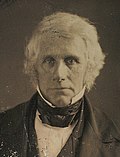Anti-Masonic
Although some had hoped for an alliance between the Anti-Masons and the National Republicans after John Quincy Adams had stepped aside for John Davis in the 1833 election, this was not to be. Many Anti-Masons remained dissatisfied with Davis's performance as governor and the newly christened Whig Party in general, particularly in their handling of political appointments along partisan lines.
On August 14, a conference was called at the home of George Odiorne between John Quincy Adams and Henry Dana Ward of New York. The three men debated the subject of the gubernatorial race, with Odiorne objecting to the nomination of Governor Davis and suggesting John Bailey, Heman Lincoln, Samuel Lathrop, or Marcus Morton. Adams countered that Worcester would back Davis, and so the choice was between Davis or Morton. Adams began to suspect the effort to fuse the Anti-Masons with Morton was a prelude to an attempt to throw Anti-Mason votes to Martin Van Buren in the 1836 presidential election.
Marcus Morton also began to organize an attempt at fusion himself, sounding out Democratic and Anti-Masonic leadership in an effort to overthrow the Whigs. Radical Anti-Masons like Benjamin F. Hallett supported this move, leading moderates like Pliny Merrick to appeal to Davis directly to denounce Masonry and avoid a union with the Democrats.
Ultimately, the Anti-Masons did not ally directly with the Jacksonian Morton or Whig Davis. At the September state convention, with both John Quincy Adams and Edward Everett declining the party's support, the Anti-Masons nominated John Bailey, an ally of Adams in the State Senate.




